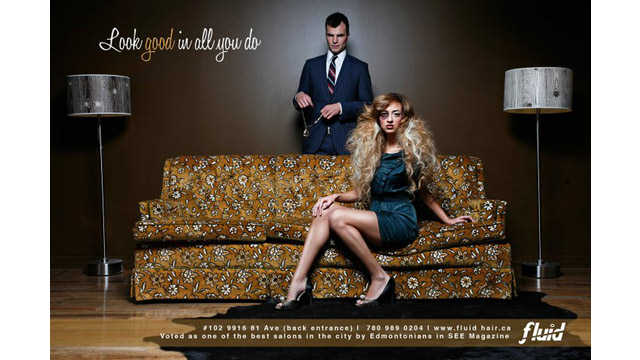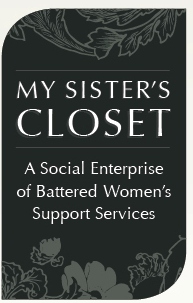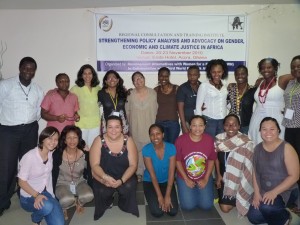Sep 4, 2011 | Battered Women's Support Services
Bic Soleil and Fluid Hair Salon: Misogynist Advertising Making News… Again
By Angela Marie MacDougall
Within the same week where an Edmonton, Alberta hair salon defended their ad depicting a woman with a battered face, a friend sent me a picture of Bic Soleil ad taken at Grant Park Mall in Winnipeg, Manitoba.
Case #1 – Fluid Hair Salon

The hair salon ad suggested they can make you look good after your boyfriend beats you up. With strong and extensive analysis and criticism that it makes light of violence against women -the owner of Edmonton-based Fluid Hair, insisted their ad was "art" and the concerned parties should "lighten up".
After the salon was vandalized the owner went on to call their ad "cutting-edge"
Salon Promises Good Hair When Partner Beats You Up
Case #2 – Bic Soleil – For Legs that Beckon

Though my friend thought that "someone" should, "raise hell" about it (and I encouraged him to do just that), in the case of the Bic ad, the response in the blogosphere has been mixed. In Toronto, after a petition, large public outcry and several ads were vandalized Bic succumbed to the pressure and pulled the ads from the subway. Zelda Lily wrote about the problems with Bic ads and the readers comments declared in no uncertain terms that they had NO problem with the ad:
Zelda Lily – On Bic Baffling Faux Vintage Ad
One blogger went further wrote in Shameless Mag – In Defence of the Bic Razor Ad
With advertisers leaning on the power of notions of artistic expression and "retro" and "ironic" advertising becoming industry standard, what’s your take?
We wrote about "Retro Sexism" and "Ironic Advertising" recently: The Desperation of Old Milwaukee Free Girl Ad
Here are a few more Vintage Ads that we’re happy to be rid of… aren’t we?
Apr 21, 2011 | Battered Women's Support Services, BWSS Programs, Violence against women
Recognizing, Understanding and Addressing Economic Abuse
By Sara Yasan,
Manager, Training and Strategic Interventions
A complex combination of social, psychological, cultural, familial and economic factors contribute to a woman’s decision to remain in, leave and/or return to an abusive/violent relationship. Beside fear of losing their children, women who live with violence and abuse, frequently cite income, employment and financial stability as the strongest, most immediate deterrents to leaving abusive situations.
Impacted by the legacy of debt and imposed bankruptcies, even after leaving an abusive relationship, many women struggle to eat, find a safe place to live, achieve academic goals, support their children and rebuild their lives.
To understand the dynamics of financial abuse and the experiences of women survivors, we ought to recognize that financial abuse takes many forms. In fact, financial abuse is a common tactic of power and control in abusive relationships, which enables an abusive partner to control women by preventing or restricting her access to money, employment or other financial resources.
Abusive partners are motivated by the need for control and willing to use force, coercion or violence. Financial or economic abuse occurs when an abusive partner attempts to take total or partial control of woman’s financial resources, including money, property, an inheritance or employment income as well as prevent her from having access to, or making decisions for her own financial resources.
BWSS Economic Empowerment Strategies for Women: Recognizing and Addressing the Effects of Financial Abuse initiative explores and addresses the impacts of financial abuse on the lives of women.
Our objective through this initiative is to equip women survivors of violence, advocates, other frontline workers, policy analysts and other systems, institutions and government entities with strong analysis, practical resources, and information grounded in the lived experiences of women; through gaining these knowledge and skills these civil servants are better able to enhance women’s ability to engage in all levels of society; and, they are more capable of assisting women who are living with violence and abuse in achieving financial safety.
In order to ground ourselves in the experiences of women, through the month of April 2011, women who access our services were invited to take part in focus groups. Women were invited to share their stories and struggles as they experienced, and continue to experience, the impact of financial abuse.
The first session of the focus group series were held on April 7th, 2011. Nearly 40% of the women who participated in the group were either Indigenous or Immigrant women. Each woman passionately shared her story in the group, some for the very first time. Women described the many challenges they had faced, and continue to face, as the result of living through financial abuse. They shared the impact of financial dependency on their abusive partners, who were using financial abuse as a tactic of power and control. This economic dependency, however, is reinforced by societal and systemic gender discriminations that limits or denies women the opportunities to have access to and participate in the labour market and earn equal wages as male counterparts.
Women’s narratives highlighted that while financial abuse might not be as obvious or observable as other types of abuse, it profoundly impacts the safety and well being of women. Whether manifested through lack of access to some of the most basic life necessities like food and clothing and safe shelter, or marked by the systemic denial of access to financial resources, information and education, economic and financial abuse have a serious and lasting impact on women.
BWSS’ Economic Empowerment Strategies for Women: Recognizing and addressing the effects of financial abuse is holding two more focus groups in the month of April.

BWSS’ Economic Empowerment Strategies for Women is funded by:


Founding Sponsors:


Jan 25, 2011 | Battered Women's Support Services
Development Alternatives with Women for a New Era (DAWN), is a network of feminists and activists working for economic and gender justice and political transformation in the Economic South. From the 20-23 of November 2010, several feminists from South Africa gathered in Accra, Ghana for the Regional Consultation and Training on Gender, Economic and Environmental Justice. Together, they have asserted a statement on Gender, Economic and Environmental which can be found on the DAWN website.
This statement includes an acknowledgment of the importance of the African Women’s Decade, a celebration of the African Union Protocol to the African Charter on Human and Peoples’ Rights on the Rights of Women in Africa, a call to ratify and implement the Maputo Protocol, a call for solutions to climate change based on social justice and human rights, and a demand that governments end policies which threaten food sovereignty.

To read more, add your support to the statement, or download the PDF, click here. You will be redirected to the DAWN website.









